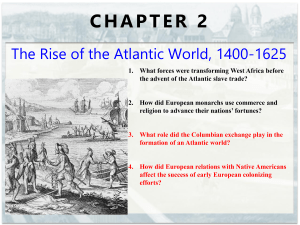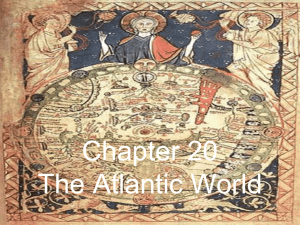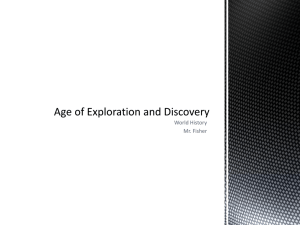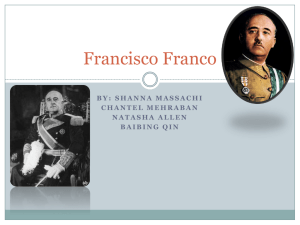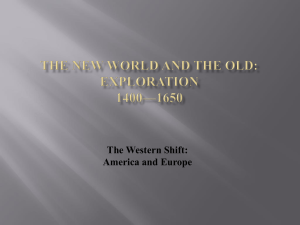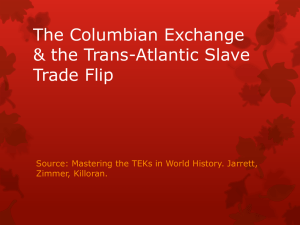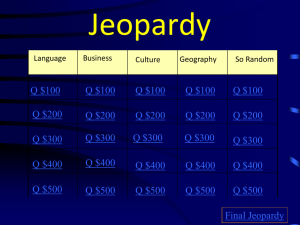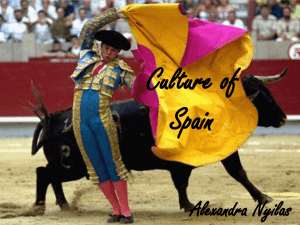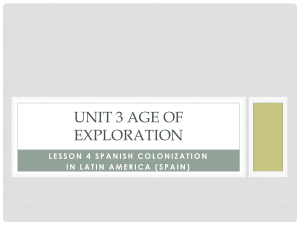Chapter 2: Rise of the Atlantic World 1400
advertisement
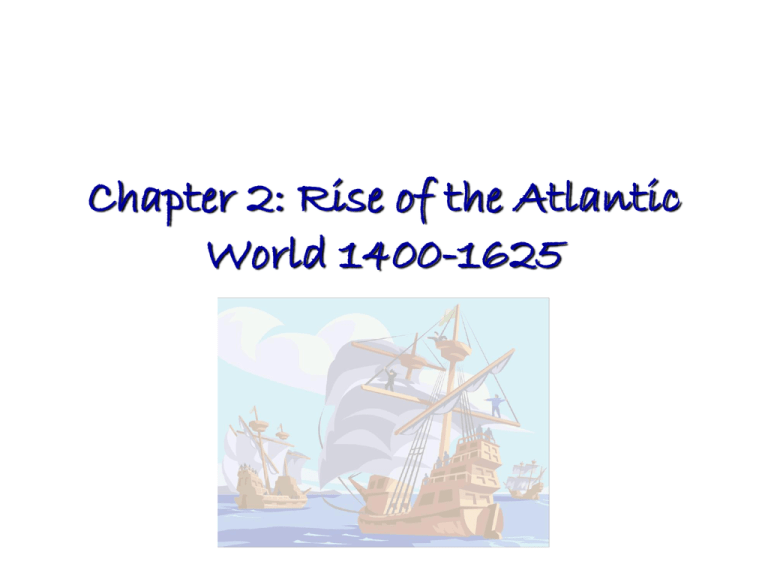
Chapter 2: Rise of the Atlantic World 1400-1625 Section 1 Focus Question: • What forces were transforming West Africa before the advent of the Atlantic Slave Trade? • How did European monarchs use commerce and religion to advance their nation’s fortunes? Big Picture: • Market W. Africa & W. Europe • Rise in Euro pop & power shift • Social, political, & religious problems. African & European Backgrounds WEST AFRICA 1. Empire of Mali a.Trading- with the Middle East b.Exports- Gold & slaves 2. Leaders & Kinship-tied clans together 3. Family Life a.Children-workers and produced money b.Farming-source of income, rotation 4. Religion-belief in the supernatural, reason for everything a. Polytheistic-more than one god African & European Backgrounds: Europe 1. Renaissance Era “Rebirth” a. Europe’s race to be # 1 b. Gender, wealth, and inherited position c. Kingdoms married to create alliances and power 2. Society Structure & Feudalism a. b. c. d. Taxation from Catholic Church = 75% poor Deforestation, overpopulation, & starvation “Poor Laws” Nuclear families mirror feudalism African & European Backgrounds: Europe 3. Business a. “Just Price” • More traditional trading practice b. “Joint Stock Companies” • Ex: VA Company or East India Company c. Capitalism or “market economies” • New business idea: “Anything to make a profit” African & European Backgrounds: Religion 1. 1200-1500 European Christian led “crusades” on Muslims. 2. 1400’s Spanish Catholics led the Spanish Reconquest spreading Catholicism. 3. Most of Europe was controlled by the Catholic Church, including the King. • Strong beliefs led to fears of witchcraft • Followers paid “indulgences” to be forgiven of sin African & European Backgrounds: Religion 4. German Monk Martin Luther 1517 • • • Protested indulgences, church “corruption” Began Protestant Reformation 95 Theses 5. John Calvin & Calvinists • • • Predestination-God can only choose your fate, try to avoid sin Denied God gave priests special powers Wanted the Bible to be translated from Latin African & European Backgrounds: Religious Upheavals 6. Counter Reformation • • • Council of Trent 1545-Ordered by Pope to change church structure, ignore Protestants Teresa of Avila & Ignatius Loyola (Jesuits) England: Anglican France & Spain: Catholic African & European Backgrounds: Reformation in England 1533-1625 7. Church of England-created after King Henry VIII requested divorce from Catherine of Aragon • Head of church, land, $, and broke alliance with Spain. • “Bloody Mary”-daughter killed Protestants • Elizabeth I-daughter allowed open religion • Calvinists: Puritans & Separatists • “No bishop, no king” The Three G’s Section 2 Focus Question • What role did Columbian exchange play in the formation of the Atlantic world? Big Picture: • Rulers search for new trade • Religious leaders seek to convert • Slave trade & colonization Europe & the Atlantic World 1400-1600 Portugal & the Atlantic 1400-1500 1. Desire for wealth, power, & trade in Asia, Africa, & Americas 2. New technology & mapping • Arab sail, compass, cartographers 3. Prince Henry “the Navigator” • • Paid sailors (Dias & de Gama) to sail around Africa to make new trading ties for gold and slaves de Gama made trade connections in India Europe & the Atlantic World 1400-1600 New Slavery & Racism 1. Slavery existed in Africa due to debt, prisoners of war, or gifts. • Eventually became apart of masters family or released 2. Europeans exchanged items for slave labor • • Trading slaves to other tribes for gold Portuguese introduced guns which fueled wars 3. “New Slavery”-slaves use for labor vs servants • 12 million traded, dehumanized, began basis for racism. Europe & the Atlantic World 1400-1600 To American and Beyond, 1492-1522 1. 1492-Columbus & Spain exploration of the West Indies (Cuba/Hispaniola) led others to race for Asia. 2. Treaty of Tordesillas-Spain (N) & Portugal (S) would split future discoveries in the Americas, blocking others. • • • • England-John Cabot to Canada France- Jacques Cartier to Nova Scotia Italy-Amerigo Vespucci, “named” America Spain-Ferdinand Magellan around S. America Europe & the Atlantic World 1400-1600 To American and Beyond, 1492-1522 3. Spain • • • Used slave labor or local Tainos to mine gold Established Puerto Rico (Ponce de Leon), Jamaica, & Cuba Converting Natives 4. Conquistadores • • Cortez- “New Spain” or Mexico-Aztecs (25 mil killed) Pizarro-Peru-Incas Europe & the Atlantic World 1400-1600 Columbian Exchange 1. Linked Europe, Africa, & Americas • • • Diseases, food, & animals Racial slavery Colonization by Europeans 2. Small pox killed millions of Natives 3. New crops destroyed the soil • Sugar &tobacco 4. Cultures combined • • Métis-Indian & Europeans Mestizos-Indian & Spanish Section 3 Focus Question • How did European relations with Native Americans affect the success of early European colonizing efforts? Big Picture: • Europeans moved to Mexico, Caribbean, & Americas. • Colonization proved unrealistic • NA populations decreased Footholds in North America 1512-1625 Spain 1. Exploration of “New Mexico” or Mexico & Florida • • • • Ponce de Leon “La Florida” Cabeza de Vaca—N. Mexico de Soto—Florida to Appalachian de Coronado—Mexico to Southwest 2. St. Augustine, FL—1565 1st Spanish fort • Used as missionary or “presidio” 3. Ecomiendas—giving Native slave labor to any Spaniard immigrating to the colony. Footholds in North America 1512-1625 France 1. Giovanni de Verranzano—1524 • • Look for a Northwest Passage to Pacific Carolinas to Newfoundland 2. Jacques Cartier—1536 • Newfoundland, Quebec, & Nova Scotia 3. Calvinist Huegonots—1562 • • Jacksonville, FL for religious freedom Killed by Spanish 4. Fur trade & alliance with Huron & Algonquians. 5. Samuel de Champlain—1608 • “New France” or Quebec Footholds in North America 1512-1625 England 1. Christian England vs Catholic Spain & France • • Elizabeth I funded attacks on Spanish ships (Drake) Spain gave Catholic Ireland money to fight England 2. Main objectives: NW Passage & gold • • 1570’s—failure in California & Canada 1584—Attempt in Roanoke, Virginia with Sir Walter Raleigh ended in “lost colony” Footholds in North America 1512-1625 Virginia 1603-1625 1. 1604—Truce with Spain, handing over VA • • “Joint-stock” fund colonization Maine to North Carolina 2. Jamestown, VA 1607—failure! • • • John Smith, military leader raided local Powhatans NA hoped for alliance to avoid further conflicts 1st Anglo-Powhatan War 1610 3. Tobacco—major cash crop • Need for indentured servants (4-7 years service) 4. By 1622—VA; no money, low population, & no alliances. Footholds in North America 1512-1625 New England 1. Thomas Weston, 1620 led 24 families on Mayflower to Plymouth, MASS • Mostly Separatist Puritans who left England, went to Netherlands • Gather furs & lumber for 7 years = own land 2. Mayflower Compact 3. Alliance with Squanto & Samoset 4. “New Netherland” 1609 • • • Settled along Hudson River, trading furs with Iroquois Established Manhattan Caused competition with French
